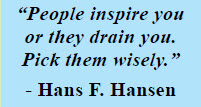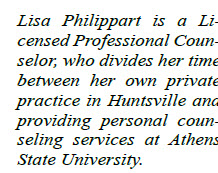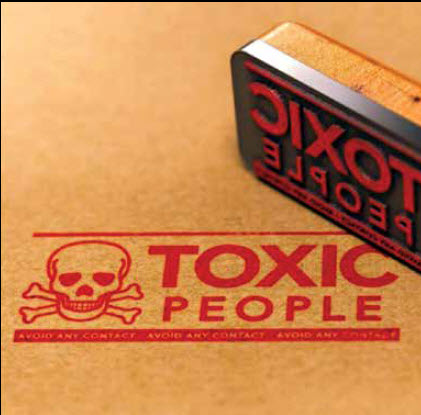 By: Lisa Philippart
By: Lisa Philippart
In my last article, we discussed recognizing the different types of toxic people and their characteristics. In this article, we will look at ways of dealing with these poisonous people in our lives. Wouldn’t it be wonderful if we were able to see ourselves as genuinely self-assured, with confidence of our self-worth and having the capability to see the real deal in our relationships? However, most of us have had to struggle with at least one toxic relationship, and some of us are fighting this battle on a daily basis. Here are some strategies that you can use to manage run-ins with people who seem to bring you down, try to gain the upper hand, or just like feeling good by making you feel bad.
First, don’t normalize abusive behavior. If you have been in a toxic relationship where the person was demeaning, marginalizing, or dismissive of you or family members, you may have learned to rationalize the behaviors by saying, “They’re only words,” denying they were ever said, or asserting that the real problem was your sensitivity. Refusing to answer you or ignoring you is also abusive behavior of the silent variety. Lying is toxic but so is telling partial or edited truths, and then when challenged, blaming you! Bottom line: Emotional and verbal abuse are never okay. Learn to trust your gut. One reason people stay in these relationships is the lack of trust in themselves or their judgment. Are your default statements, “She didn’t really mean what she said, it was just the heat of the moment,” or “He didn’t realize how hurtful that was. Once I let him know, I’m sure he’ll come around.”? Sound familiar? Now is the moment to stop and consider why you are doing the excusing or rationalizing.
 Have you ever heard of the sunk cost fallacy? A study by Daniel Kahneman and Amos Twersky shows that humans are famously loss-averse, and prefer to hold onto what they have in the short-term…even if giving up a little will get them more in the long run. We prefer the known to the unknown, even if the known makes us unhappy. This leads to an unconscious pattern called the sunk cost fallacy, which keeps us in places we ought not to be, including toxic relationships. Specifically, this is the habit of the mind that focuses on what you have invested in something (emotion, time, effort, or even money) and keeps you in place so as not to lose that investment. Of course, whatever the investment is, you can’t retrieve it under any circumstances, whether it’s the years you put into a relationship or money you put into a failing car; so there’s no real logic to this thinking. This fallacy has been used to justify all sorts of behaviors, including wars and failing marriages. If you catch yourself thinking about what you have sunk into a relationship with a toxic person, start thinking instead about where you might find yourself if you let go. The word “fallacy” says it all.
Have you ever heard of the sunk cost fallacy? A study by Daniel Kahneman and Amos Twersky shows that humans are famously loss-averse, and prefer to hold onto what they have in the short-term…even if giving up a little will get them more in the long run. We prefer the known to the unknown, even if the known makes us unhappy. This leads to an unconscious pattern called the sunk cost fallacy, which keeps us in places we ought not to be, including toxic relationships. Specifically, this is the habit of the mind that focuses on what you have invested in something (emotion, time, effort, or even money) and keeps you in place so as not to lose that investment. Of course, whatever the investment is, you can’t retrieve it under any circumstances, whether it’s the years you put into a relationship or money you put into a failing car; so there’s no real logic to this thinking. This fallacy has been used to justify all sorts of behaviors, including wars and failing marriages. If you catch yourself thinking about what you have sunk into a relationship with a toxic person, start thinking instead about where you might find yourself if you let go. The word “fallacy” says it all.
 It may be time for you to recognize the traits that make you easy prey. Assessing what you bring to the relationship doesn’t mean taking responsibility or the blame for someone’s mistreatment of you. Is it your need to please or your fear of rocking the boat that keeps you tongue-tied when people verbally assault you for their bad mood? Take some time to coolly process the interactions that make you unhappy, focusing on why you felt as you did, not what you felt, and see if you can identify a pattern. Sometimes those who struggle with self-esteem or self-confidence issues confuse the toxic person’s need to control and impress with strength and perseverance. It might be worth your time to read up on attachment styles to see how that might be affecting how you choose your friends and partners. There’s more to learn, so you will have to wait for my next article…Part Two of “Dealing With Toxic People.”
It may be time for you to recognize the traits that make you easy prey. Assessing what you bring to the relationship doesn’t mean taking responsibility or the blame for someone’s mistreatment of you. Is it your need to please or your fear of rocking the boat that keeps you tongue-tied when people verbally assault you for their bad mood? Take some time to coolly process the interactions that make you unhappy, focusing on why you felt as you did, not what you felt, and see if you can identify a pattern. Sometimes those who struggle with self-esteem or self-confidence issues confuse the toxic person’s need to control and impress with strength and perseverance. It might be worth your time to read up on attachment styles to see how that might be affecting how you choose your friends and partners. There’s more to learn, so you will have to wait for my next article…Part Two of “Dealing With Toxic People.”
By: Lisa Philippart
Licensed Professional Counselor










 June 20, 2025
June 20, 2025



